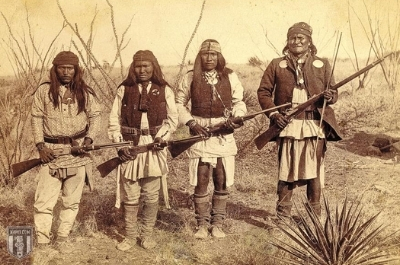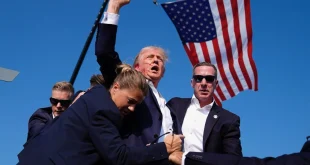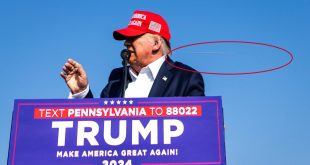Herland Report: Gun Control and Racism: The laws and taxes were initially meant to limit minority gun ownership in America.
The racially motivated attacks on the Second Amendment is explored in this article, as the point is being made that the right to bear arms means the right for minorities to defend themselves against oppression.
 An inalienable right is one that exists regardless of whether or not it is recognized by the state. For example, you have a right to free speech regardless of whether or not the Constitution recognizes it.
An inalienable right is one that exists regardless of whether or not it is recognized by the state. For example, you have a right to free speech regardless of whether or not the Constitution recognizes it.
Thus any restrictions on free speech are curbs of this pre-existing right, not an actual elimination of that right. One of them is the right to keep and bear arms. Another is the right to a speedy and public trial.
However, particularly with the Second Amendment, there’s long been a struggle between the ideals of America and the reality on the ground with regard to race. What’s more, minorities in the United States are disproportionately the victims of violent crime, writes chief historian, Sam Jacobs at Ammo.com. His work has appeared at Bloomberg, USA Today and National Review, ZeroHedge, Lew Rockwell and Sons of Liberty Media.
Both of these things together make it crucial to understand self defense and the Second Amendment from the perspective of race in America.

Gun Control and Racism: Part of the problem is that, unlike European nations which grew organically, America is an invention of a handful of Englishmen. They founded the nation on a set of ideas and there has always been a tension between those ideas and the reality.
This is, in some sense, unavoidable: reality will always have trouble living up to an ideal. A failure to live up to that ideal in the past according to terms established today doesn’t make the entire project – or any specific part of it – worthless or suspect.
RELATED ARTICLES:
- John Whitehead: We are run by a Money Elite.
- The Eroding Constitutional Rights in America.
- The 9/11 Attacks: Understanding the Fall-Out from America’s Secret War.
- New Left Tyranny: Globalist Capitalism reintroduces the feudal system with Oligarch Overlords
Before we get into the meat of the matter, we should note that the American ideal has expanded the Second Amendment (and the rest of the Constitution for that matter) to de jure include all Americans. One can be skeptical of the notion of “progress” while seeing the moves to repeal race-based restrictions on firearms ownership as big steps in the right direction.
Finally, it is worth noting – and we will do so at length later – that none of the racially-motivated laws on the books in America are uniquely American. Racism, in the sense employed by the average person not the expanded version used by left-wing ideologues, was not a uniquely American institution, but the norm throughout human history.

Gun Control and Racism: The Second Amendment does not “give” Americans the right to keep and bear arms. The Second Amendment recognizes the pre-existing right to keep and bear arms that exists independently of the Constitution.
Anyone reading this website, however, knows that this right is in constant peril from gun grabbers. And, unfortunately, until the 1960s, this right was particularly imperiled for black Americans and other minorities. It is worth exploring the history of racially motivated attacks on the Second Amendment.
The first gun laws were drafted even before the founding of the United States, with the first General Assembly of Virginia passing what might well be the first gun control law in America in 1619. It was specifically designed to restrict the right of Native Americans to own firearms:
“That no man do sell or give any Indians any piece, shot, or powder, or any other arms offensive or defensive, upon pain of being held a traitor to the colony and of being hanged as soon as the fact is proved, without all redemption.”
There was, of course, logic to this: The government of Virginia was looking for ways to punish colonists who were supplying potentially hostile Indian tribes with weapons that might level the playing field.
Such laws were by no means limited to the English colonies – they were present virtually everywhere in the world. America and the colonies that preceded it are not unique at all in this sense. Until abolition began, first in the UK and later in the United States, slavery was the norm throughout the world. Alongside this came a racial caste system and a series of laws that largely robbed people of their right to keep and bear arms.
While it is currently fashionable to view the United States as somehow a “necessarily racist” nation or even “built on slavery and genocide,” this is simply not the case.
In fact, no less a light of the abolitionist movement than Frederick Douglass considered this point of view to be a slander against the Founders. The fact is that the Founders were a product of their time – nothing more, nothing less.
Thomas Jefferson, the very man who wrote that “all men are created equal,” is an excellent study in the contradictory and complex nature of the Founding Fathers. He came from the patrician Southern planter class. As such, he owned over 600 slaves. But he also spoke against slavery and even made some attempts to legislatively curb it. He called slavery both “a hideous blot” and “moral depravity.”
Among the legislation that he proposed to curb slavery in North America were a Virginia law prohibiting the importation of new African slaves and an ordinance to ban slavery in the Northwest Territory. Yet, he held slaves until he died and, even though it was legal to do so, only manumitted a slender few on his death.
Gun Control and Racism: The 1619 Project view of American history – that slavery is the defining institution of the United States – is simply false.
Few Americans owned slaves and those who did tended to own either one or two or a whole lot. America did not invent slavery, but it did fight one of the bloodiest wars in human history to get rid of it.
In the same year, the first African slaves were brought to America when the privateer White Lion had its cargo of 20 African slaves seized from a Portuguese slave ship and brought to Jamestown, Virginia. It took another 21 years for slave codes to begin appearing in the colony. One of the first of these made it illegal for all “free mulattos and negroes” to bear arms. South Carolina instituted similar slave codes in 1712.
Starting in 1751, the French Black Code – aka “Code Noir” – required Louisiana colonists to stop any blacks, and if necessary, beat “any black carrying any potential weapon, such as a cane.” This included a “shoot to kill” authorization for any blacks who would not stop on demand or was on horseback. New Spain likewise prohibited all blacks from carrying arms of any kind.
After the Revolutionary War, there were both federal gun control laws, as well as those issued by the states, with Louisiana,Florida, Maryland, Georgia, North Carolina, Mississippi and Delaware all passing multiple laws designed to prohibit people of color from owning and carrying firearms.
In 1857, the Supreme Court made the Dred Scott decision which, among other things, determined that free black descendants of slaves cannot be citizens of the United States. Thus, they were not considered to be protected by the Second Amendment or any other provisions of the United States Constitution. Following Turner’s Rebellion, Virginia repealed the law, allowing slaves to bear arms in extremely limited circumstances.
During the War Between the States, the Union Army was badly in need of soldiers and began calling upon blacks to fight with the Militia Act of 1862. Black soldiers generally received lower pay and were often laborers supporting the war effort by taking on other tasks so that the white soldiers could fight.
The Militia Act offered freedom to black soldiers and their families for their service. By the end of the war, approximately 185,000 black soldiers served in the United States military through the War Department’s Bureau of Colored Troops. Many of these troops brought their military arms back with them when the fighting was done, only to lose them or be legally prosecuted under the so-called “black codes.”
After the War, a number of states passed black codes to restrict the rights and even movement of freed blacks. This often meant the prohibition of keeping firearms and even certain classes of knives.
During the Reconstruction Era, black Southerners not only enjoyed the same rights as their white counterparts, but often held positions of power in the state governments. For example, the first minority governor in the United States was a black man, P. B. S. Pinchback, who served as Governor of Louisiana in 1872 and 1873. No fewer than six black men served as Lieutenant Governors of southern states.
At the end of Reconstruction, however, many of these rights were repealed in clandestine ways, to say nothing of the constant terror attacks from groups like the White Brotherhood and the Ku Klux Klan.
In January 1866, Harper’s Weekly reported that in Mississippi, such groups had “seized every gun and pistol found in the hands of the (so called) freedmen” in parts of the state.
The Black Codes, which attempted to rob newly freed blacks of their freedom, were not without resistance, both from the Reconstruction-era federal government and the black citizens themselves. The first civil rights act in American history made freedmen citizens and criminalized any attempt to rob them of their rights. Senator James Nye explicitly stated that freedmen were entitled to “equal right to protection, and to keep and bear arms for self defense.”
Self defense and the right to keep and bear arms were raised during debate and discussion over the 14th Amendment. Representative John Bingham of Ohio saw the crux of the matter being the “privileges or immunities,” which he said were “chiefly defined in the first eight amendments to the Constitution.”
RELATED ARTICLES:
- Exclusive interview with Paul Craig Roberts: Totalitarian Democracy.
- Marcuse and The New Left’ desire to silence the Majority – Nabintu, WND.
- Edmund Burke: Conservative Disdain for Revolution – Hanne Herland, WND.
- US Senator Richard Black: Herland Report global reach, speaks truth, genuine substance.
Gun Control and Racism: Jacob Howard of Michigan, who sponsored Bingham’s amendment in the Senate, specifically mentioned “the freedom of speech and of the press,” “the right to be exempt from unreasonable searches and seizures,” and “the right to keep and bear arms.”
We believe that the Second Amendment is not restricted to militias as its detractors claim. But even if we grant that it were, the 14th Amendment, which dramatically changed the meaning and function of the Constitution, clearly specifies that it is not.
Yale law professor Akhil Reed Amar noted that, “Between 1775 and 1866, the poster boy of arms morphed from the Concord minuteman to the Carolina freedman.”
Many Southern states simply began regulating firearms through statute and firearms owned by black Americans more heavily as a matter of custom. Tennessee and Arkansas passed laws banning all handguns except expensive models that most minority populations couldn’t afford, while Alabama and Texas placed heavy taxes on firearm sales.
Mississippi took it a step further and enforced gun sellers to keep a record of who purchased handguns and handgun ammunition, basically keeping a gun registration that would later be demanded and used to confiscate the handguns of blacks.
The state of California passed the Mulford Act, gun control legislation that prohibited people from carrying loaded weapons in public and was a direct response to the armed Black Panthers who would patrol black communities.
Indeed, the entire civil rights movement informed what was, at the time, largely a conservative-led backlash against Second Amendment rights. There is, of course, the famous example of Governor Ronald Reagan passing the most sweeping gun control law of its time in direct response to armed Black Panthers at the state capitol building.
Although Martin Luther King was denied a concealed carry permit during the Civil Rights Movement, his home was described as being like “an arsenal” due to the need to defend himself against violent attacks.
Today, no one would openly suggest that the rights of black Americans to keep and bear arms should be restricted. Thus, those who would restrict the rights of black Americans to defend themselves seek more covert ways of doing so. In the past, Ammo.com has supported organizations dedicated to arming Jews and blacks legally in the United States. Read the full article here.
Gun Control and Racism: Also check out these topics at CNN or FOX News. Other sources may be New York Times, USA Today, the Washington Post or from the British angle, BBC, The Guardian, The Telegraph or Financial Times.
The level of censorship in social media and search engines is all-time high. Do like thousands of others, subscribe to The Herland Report newsletter here! Led by Scandinavian bestselling author, Hanne Nabintu Herland, The Herland Report news and opinion website provides independent analysis from leading Western intellectuals and ground breaking YouTube interviews, cutting through the mainstream media rhetoric. It is a great place to watch interviews and read the articles of leading intellectuals, thought leaders, authors and activists from across the political spectrum. The Herland Report believes in freedom of speech and its editorial policy resides above the traditional Left vs Right paradigm which we believe has lost its relevance and ability to describe the current driving forces in Western politics.









